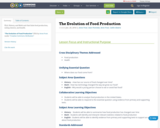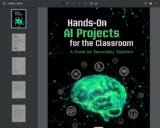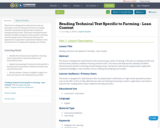
ELA, History, and Math unit that links food production, eating choices, and health.
- Subject:
- English Language Arts
- Mathematics
- Social Science
- Material Type:
- Unit of Study
- Date Added:
- 03/28/2015

ELA, History, and Math unit that links food production, eating choices, and health.

This guide provides student-driven projects that can directly teach subject area standards in tandem with foundational understandings of what AI is, how it works, and how it impacts society. Several key approaches were taken into consideration in the design of these projects. Understanding these approaches will support both your understanding and implementation of the projects in this guide, as well as your own work to design further activities that integrate AI education into your curriculum.
Project 1: AI Chatbots
Project 2: Developing a Critical Eye
Project 3: Using AI to Solve Environmental Problems
Project 4: Laws for AI
Visit the ISTE website with all the free practical guides for engaging students in AI creation: https://www.iste.org/areas-of-focus/AI-in-education

Every media source has a story to tell--a driving purpose. The media that people consume largely shapes their world views. The US public is becoming more divided partially due to the consumption of increasingly biased news. As a critical consumer of media, It is important to be able to separate fact from opinion. In this unit, adapted from the high school version, students will become critical consumers of news, by identifying media bias in order to become better informed citizens. NOTE: This unit has been adapted for use at the middle school level from the resource Identifying Media Bias in News Sources by Sandra Stroup, Sally Drendel, Greg Saum, and Heidi Morris.

Are mummies pieces of history, or the sacred remains of human ancestors?

Natural High is a non-profit organization that focuses on the power of storytelling to transform lives. They engage storytellers who kids admire and trust and work with these influencers to create free and impactful content for educators and parents.The activities are designed to develop student understanding about the consequences of drug and alcohol abuse and also to support students in learning and practicing strategies to make healthy decisions. The evidence-based program is used in all 50 states and makes use of current scientific findings on youth behavior, brain development, social norming, and substance abuse prevention.This resource highlights activities in the Understanding the Consequences of Drugs and Alcohol area of focus. Visit the Natural High website at https://www.naturalhigh.org/ for additional materials.

This lesson is designed for adult learners who are pursuing a career in farming. It focuses on reading scientific and technical texts (Grade 6) related to farming and farm loans. This lesson will help learners identify and define technical words specific to farming and borrowing money. The learners will have the opportunity to apply their acquired knowledge in class activities such as reading and analyzing case studies.

Objectives of this mini unit:For students to explore the "universal call to action" laid out in the Sustainable Development Goals (SDGs) and consider how they may respond to that call;Build background knowledge about specific issues impacting the Arctic including: indigenous rights, indigenous health, biodiversity, tourism and marine pollution; Build background knowledge about specific issues impacting their local communtiy (using Michigan as a case-study) including: hunger, homelessness, poverty, youth violence and the environment;Create an action plan to address needs within their local communities driven by their unique passions, interests and skills;Consider the importance of impact vs intention when engaging with community action projects

***This curriculum is provided by The Edible Schoolyard Project with full permission to share*** Understanding Organic: Connections to Action in the Garden Classroom is a garden and classroom-based curriculum for middle to high school students that explores the concepts and meanings of organic agriculture. The curriculum consists of a short preparatory unit, a sequence of ten core lessons, and twelve optional extension inquiries that can also be taught as standalone lessons. The ten core lessons utilize hands-on explorations of organic practices and feature textual analysis and open discussions to examine the complex meanings of organic. The final project workbook introduces students to a social action project in which students apply their knowledge and experiences to enact justice-oriented change related to organic. We recommend that you start by reading the curriculum overview linked below before reading individual lessons.